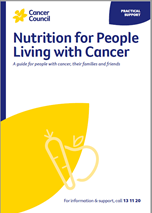- Home
- Acute lymphoblastic leukaemia (ALL)
- Managing side effects
- Other common side effects
Other common side effects for ALL
Learn about these other common side effects:
- Nausea
- Appetite changes
- Mouth problems
- Changed bowel habits
- Nerve and muscle effects
- Hair loss
- Thinking and memory changes
- Infertility
- Osteoporosis
Nausea
You will be given anti-nausea medicine to take before and during chemotherapy. If you still feel sick (nauseous) or vomit after taking the medicine, let your doctor know so another can be tried.
Appetite changes
Chemotherapy drugs may affect your appetite or change how food tastes. Try eating snacks frequently instead of large meals, and enriching drinks with powdered milk, yoghurt or honey. A dietitian at the treatment centre can help you work out an eating plan.
For more on this, see Nutrition and cancer, and listen to our podcast below on Appetite Loss and Nausea.
Mouth problems
Chemotherapy can cause mouth sores (such as ulcers), tooth or gum infections, and a dry mouth. To keep your mouth comfortable, sip water throughout the day and eat moist foods such as casseroles and soups.
Your health care team may prescribe mouthwashes, or you can rinse your mouth four times a day with ¼ tsp bicarbonate of soda and ¼ tsp salt dissolved in a cup of warm water. Have regular dental check-ups.
Tell the dentist about the type of treatment you are having and talk to your haematologist before you have any dental work.
Read more about mouth health and cancer treatment.
Changed bowel habits
Hard, dry bowel movements (constipation) or loose, watery movements (diarrhoea) can be caused by chemotherapy drugs and other medicines. Tell your doctor or nurse if your bowel habits have changed, as it is important to act early to prevent further problems. They may suggest changing what you eat or medicines.
Nerve and muscle effects
Some chemotherapy drugs can cause tingling (“pins and needles”), pain or loss of feeling in your fingers and/or toes, and muscle weakness in your legs. This is called peripheral neuropathy. It is usually a short-term issue, but for some people, it can last a long time or even be permanent.
If you experience these side effects, tell your doctor or nurse before your next treatment. Your treatment may need to be changed or the problem may need to be carefully monitored.
For more on this, see peripheral neuropathy.
Hair loss
This is a common side effect of some chemotherapy drugs and is usually temporary. Some people find it better to cut their hair short when it starts to fall out. Wearing some form of head covering will help keep you warm and protect your head from direct sunlight.
Look Good Feel Better runs free workshops on managing appearance-related side effects.
Read more about hair loss.
Thinking and memory changes
Some people have difficulty concentrating, focusing and remembering things after chemotherapy. This is called cancer-related cognitive impairment or, sometimes, “chemo brain” or “cancer fog”. These problems usually improve with time, although some people experience issues for years. Tell your doctor if this issue is affecting your day-to-day life or return to work.
For more on this, see Changes in thinking and memory, and listen to our podcast on Brain Fog and Cancer.
Infertility
If you have periods, they may become irregular during treatment, but return to normal when it finishes. For other people, periods stop permanently (menopause). After menopause, it is no longer possible to have a child naturally. Chemotherapy drugs may lower the number of sperm produced and reduce their ability to move. This can sometimes cause infertility, which may be temporary or permanent.
Total body irradiation can also reduce sperm production. Speaking to your doctor or a counsellor about your feelings and individual situation can be helpful.
For more on this, see Fertility and cancer.
Osteoporosis
Early menopause may cause bones to become weaker and break more easily. This is called osteoporosis. Talk to your doctor about having a bone density test or taking medicines to prevent your bones becoming weak. Healthy Bones Australia has more information on preventing osteoporosis.
→ READ MORE: Life after treatment
Podcast: Appetite Loss and Nausea
Listen to more episodes from our podcast for people affected by cancer
More resources
Dr Jonathan Sillar, Haematologist, Calvary Mater Newcastle (clinical review); Dr Scott Dunkley, Haematologist, Royal Prince Alfred Hospital and Chris O’Brien Lifehouse; Sharon Frazer, Consumer; Dr Robin Gasiorowski, Staff Specialist, Haematology, Concord Hospital; Prof Angela Hong, Radiation Oncologist, Chris O’Brien Lifehouse, and Clinical Professor, The University of Sydney; Yvonne King, 13 11 20 Consultant, Cancer Council NSW; Heather Mackay, Clinical Nurse Consultant – Haematology, Westmead Hospital; Katelin Mayer, Clinical Nurse Consultant, Cancer Outreach Team, Nelune Comprehensive Cancer Centre.
View the Cancer Council NSW editorial policy.
View all publications or call 13 11 20 for free printed copies.

